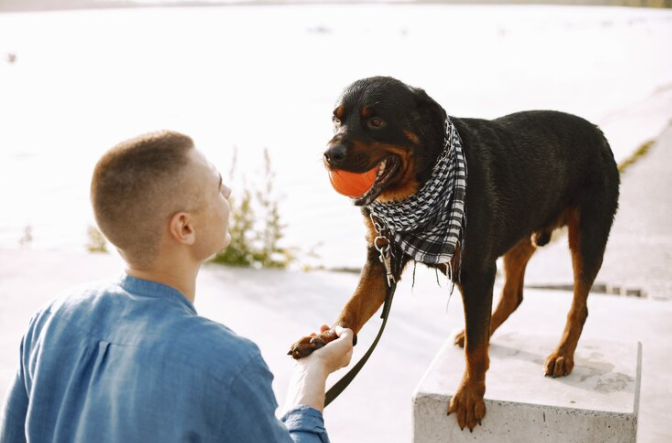Are you struggling to find the right dog trainer for your furry friend? Look no further! In this article, we will guide you on how to identify a good dog trainer who will bring out the best in your canine companion. Finding a reputable and experienced Falls Church dog trainer is essential for the overall well-being and behavior of your beloved pet.
The Importance of Finding a Good Dog Trainer
A good dog trainer can make all the difference in shaping your dog’s behavior and ensuring they are well-behaved members of society. Training is not just about teaching basic commands and tricks; it is about fostering a positive and trusting relationship between you and your furry friend. A skilled trainer possesses a deep understanding of canine behavior and knows how to effectively communicate with and motivate dogs.
Qualities to Look for in a Dog Trainer
When searching for a dog trainer, there are several key qualities you should consider. First and foremost, a good trainer should be patient and compassionate. Dogs, like humans, have unique personalities and learning styles. A trainer who understands and respects this will be able to tailor their approach to meet the specific needs of your dog.
Another important quality to look for is effective communication skills. A good trainer knows how to clearly and confidently convey instructions to both you and your dog. They should be able to explain training concepts in a way that is easy to understand and provide guidance on how to reinforce training at home.
Additionally, a good dog trainer should employ positive reinforcement techniques. This means focusing on reward-based training rather than punishment. Positive reinforcement encourages desired behaviors by rewarding them, which creates a positive learning experience for your dog. Punishment-based methods can lead to fear and anxiety, which can have long-lasting negative effects on your dog’s behavior. Falls Church puppy trainers know that dogs develop habits at a young age so it’s critical to establish a positive Northern Virginia dog behavior modification experience early in their lives.
Ask for Recommendations and Do Your Research
One of the best ways to find a good dog trainer is by asking for recommendations from friends, family, or your veterinarian. These individuals are likely to have firsthand experience with trainers in your area and can provide valuable insights into their methods and effectiveness.
In addition to recommendations, it’s important to do your own research. Look for trainers who have positive reviews and testimonials from satisfied clients. Check if they have a website or social media presence where you can learn more about their training philosophy and approach.
Assess the Trainer’s Experience and Credentials
When evaluating a dog trainer, it’s important to consider their experience and credentials. Look for trainers who have been working professionally for several years and have a proven track record of successful training sessions. Experience indicates that they have encountered a variety of behavioral issues and have developed effective strategies to address them.
Credentials are another important factor to consider. While not all great trainers may hold certifications, having them indicates a commitment to ongoing education and ethical training practices. Look for certifications from reputable organizations such as the Certification Council for Professional Dog Trainers (CCPDT) or the Association of Professional Dog Trainers (APDT).
Observe a Training Session or Class
Before committing to a dog trainer, it’s a good idea to observe a training session or class. This will give you a firsthand look at the trainer’s teaching style and how they interact with dogs and their owners. Pay attention to how engaged the dogs are and whether they seem happy and comfortable during the training.
Observe how the trainer handles any behavioral issues that arise and whether they use positive reinforcement techniques. A good trainer will be patient and understanding, using redirection and rewards to encourage desired behaviors.
Understand the Training Methods Used
Different trainers may use different training methods, so it’s important to understand their approach before making a decision. Positive reinforcement training methods, as mentioned earlier, are widely regarded as the most effective and humane approach to dog training. These methods focus on rewarding desired behaviors and ignoring or redirecting undesired behaviors.
Avoid trainers who rely heavily on punishment-based methods such as shock collars or physical corrections. These methods can cause fear and anxiety in dogs, leading to more behavioral issues in the long run.
Consider the Trainer’s Communication Style
Effective communication is crucial in dog training, not only between the trainer and the dog but also between the trainer and the owner. A good trainer should be able to clearly explain training techniques and provide guidance on how to reinforce training at home.
During your initial interactions with a trainer, pay attention to their communication style. Do they listen attentively to your concerns and questions? Do they provide clear and concise explanations? A trainer who can effectively communicate with you will be better equipped to support you throughout your dog’s training journey.
Evaluate the Trainer’s Success Rate
A trainer’s success rate is an important indicator of their effectiveness. Ask the trainer about their past clients and their dogs’ progress. A good trainer should be able to provide references or testimonials from satisfied clients who have seen positive changes in their dogs’ behavior.
Additionally, look for trainers who participate in competitions or trials that showcase their skills and achievements. Their involvement in these events demonstrates a commitment to continuous learning and improvement.
Trust Your Instincts and Meet the Trainer in Person
While qualifications and credentials are important, it’s also essential to trust your instincts when choosing a dog trainer. Meeting the trainer in person will give you a better sense of their personality and whether you feel comfortable working with them.
During the meeting, ask any remaining questions you may have and observe how the trainer interacts with your dog. Are they patient and gentle? Do they show genuine care and interest in your dog’s well-being? Trusting your instincts can help ensure that you choose a trainer who will not only train your dog effectively but also provide a positive and enjoyable experience.
Conclusion
Choosing a good dog trainer is crucial for your furry friend’s well-being and behavior. By considering the qualities discussed in this article, asking for recommendations, doing your research, and observing training sessions, you can identify a trainer who possesses the necessary skills, experience, and positive training methods. Trust your instincts and take the time to find a trainer who will bring out the best in your canine companion. With the guidance of a good dog trainer, you can say goodbye to frustration and hello to a well-behaved and happy dog.





